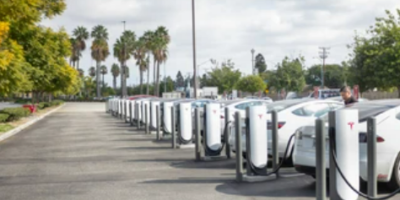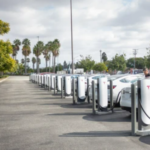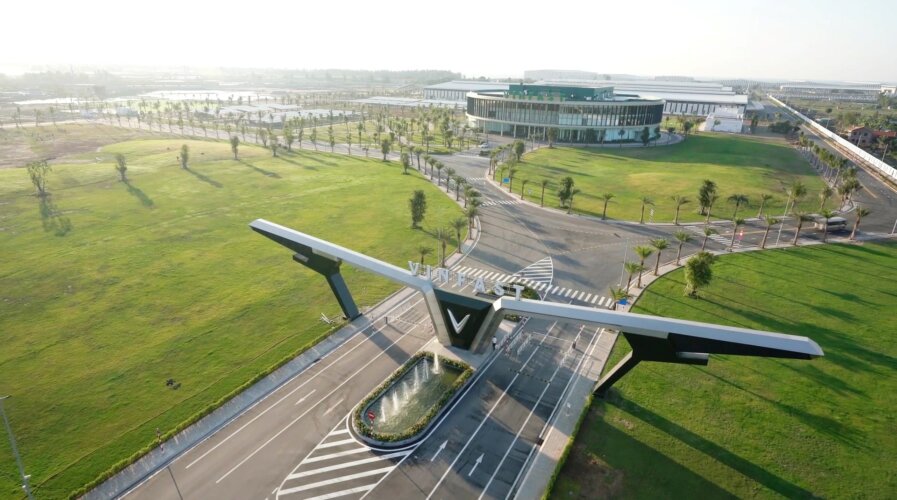
EV in India will take forward steps with the partnership of VinFast and the Tamil Nadu State Government. (Image by VinFast).
VinFast makes huge EV investments in India
- VinFast will invest up to US$2 billion in EV in India.
- The investment includes the establishment of VinFast’s integrated electric vehicle facility in Tamil Nadu.
- India is hoping to become an EV hub in Asia.
The electric vehicles (EV) industry in India continues to experience significant growth, with investments coming in from both local and foreign EV manufacturers. While India may not be the biggest EV market in the world right now, the country has the potential to become a major EV hub in years to come.
According to a report by Bain, the EV market in India is at an inflection point. In terms of sales, EVs accounted for about 5% of total vehicles sold between October 2022 and September 2023. But it’s estimated these figures could grow to encompass more than 40% of India’s automotive market by 2030, generating over US$100 billion in revenue.
To achieve this, Bain’s report says the country needs concerted strategies that include new product development, go-to-market and distribution, customer segment prioritization, software development, and charging infrastructure. Several of these interventions will require category-specific stakeholder action.
The Indian government has already introduced several initiatives to boost EVs in India. These include schemes and policies launched to support the manufacturing and adoption of EVs in India, such as:
- Faster Adoption and Manufacturing of Electric Vehicles (FAME)-I & II: This scheme provides subsidies to buyers of electric vehicles, especially those used for public transportation or commercial use. The subsidy is linked to the battery capacity of the vehicle.
- Phased Manufacturing Programme (PMP): This program aims to create a local supply chain for EV components and batteries, and to reduce the import dependence of the EV industry. It provides incentives and tax benefits to domestic manufacturers of EV parts and cells.
- National Mission on Transformative Mobility and Storage: This mission focuses on creating a roadmap for the development and deployment of advanced battery technologies and storage solutions for EVs and other applications. It also supports the establishment of large-scale battery manufacturing plants in India.
- Production Linked Incentive (PLI) Scheme for Advanced Chemistry Cells (ACC) Battery Storage: This scheme offers financial incentives to boost domestic production of ACC batteries, which are essential for EVs and renewable energy integration. The scheme envisages establishing a cumulative ACC battery manufacturing capacity of 50 GWh in India.
- Production Linked Incentive (PLI) Scheme for Automobile and Auto Component Industry: This scheme provides financial incentives to promote the manufacturing of advanced automotive technologies, including EVs and their components.
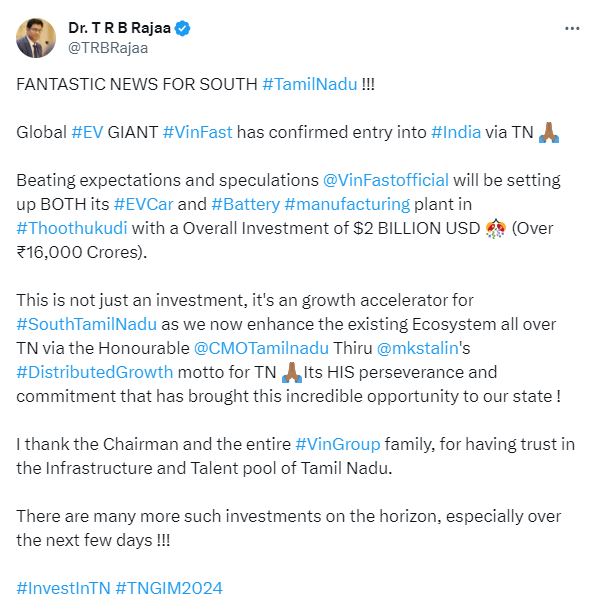
Dr. TRB Rajaa, Minister of Industries of the Government of Tamil Nadu was pleased with VinFast investment in India.
Foreign EV manufacturers in India
Currently, the biggest EV manufacturer in India is Tata Motors, which is a well-known car maker in India and the largest EV producer in the country. Tata Motors has launched several EV models, such as the Nexon EV, the Tigor EV, and the Tiago EV, and has also developed its own Ziptron technology for battery and motor performance.
India is also home to several foreign EV manufacturers that have set up plants in the country. The foreign EVs manufactured in India are both for local markets as well as to be exported to other countries as well.
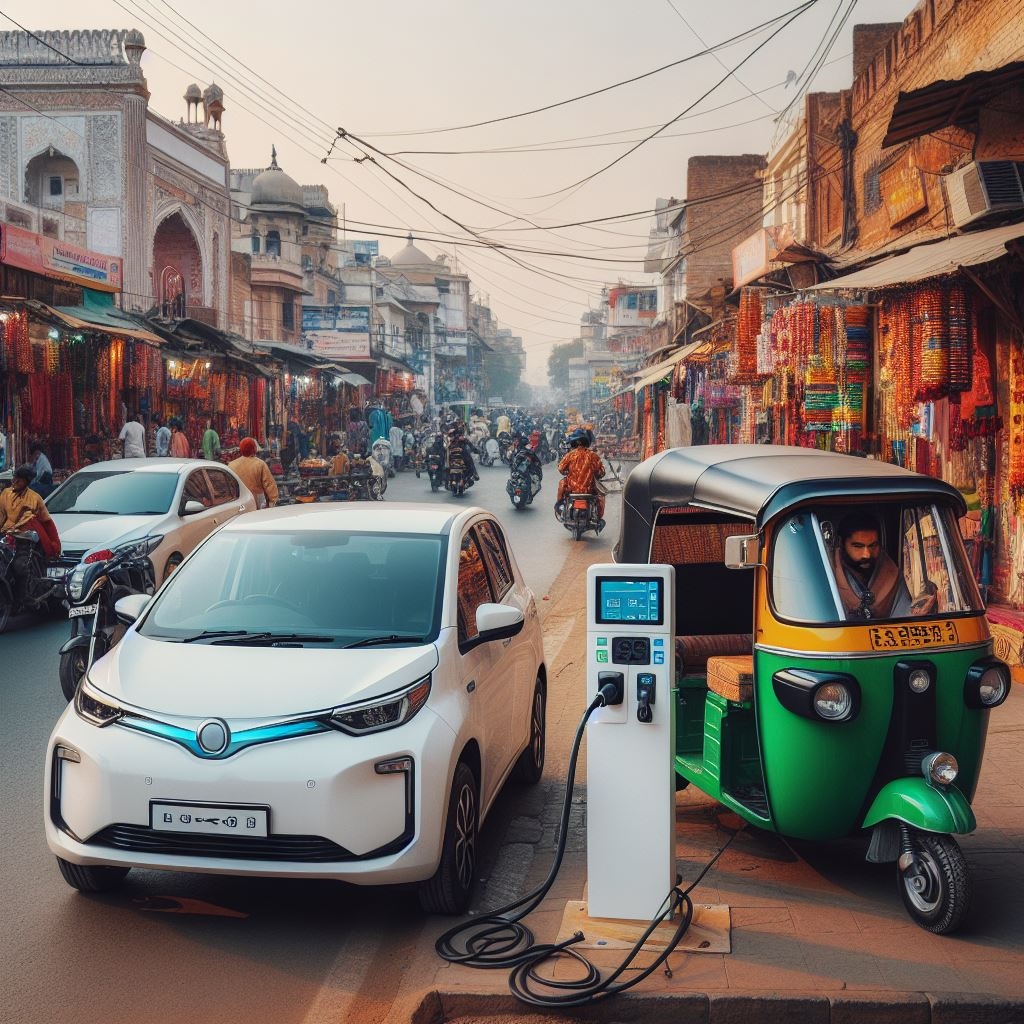
The Indian government has already introduced several initiatives to boost EVs in India. (Image generated by AI).
Currently, some of the foreign EVs in India include:
- Hyundai – The South Korean automaker already has a presence in India with its conventional and hybrid vehicles. The company is planning to start producing EVs at its Talegaon factory in Maharashtra from 2025, with an annual capacity of 100,000 units.
- MG Motor – The British-owned, Chinese-backed automaker that launched its first EV model, the ZS EV, in India in 2020. The company has a manufacturing facility in Halol, Gujarat, where it plans to increase its EV production capacity from 3,000 units per year to 10,000 units per year by 2022.
- BYD: The Chinese EV maker has partnered with India’s Olectra Greentech to produce electric buses and vans in India. The company has a manufacturing facility in Hyderabad, Telangana, where it can produce up to 5,000 electric buses per year.
Tesla is also expected to announce manufacturing plans in India this year. In fact, Tesla has been exploring the possibility of entering the Indian market for several years. However, the company has faced some challenges and delays due to the high import duties, regulatory hurdles, and infrastructure issues in India.
Last year, Indian Prime Minister Narendra Modi met up with Elon Musk and was able to convince him to invest in the country. As such, there have been reports that Tesla is inching closer to an agreement with the Indian government to start importing and selling its EVs in India in 2024. The company is also reportedly considering the states of Gujarat, Maharashtra, and Tamil Nadu for setting up its first-ever manufacturing facility in India, which could be operational by 2025.
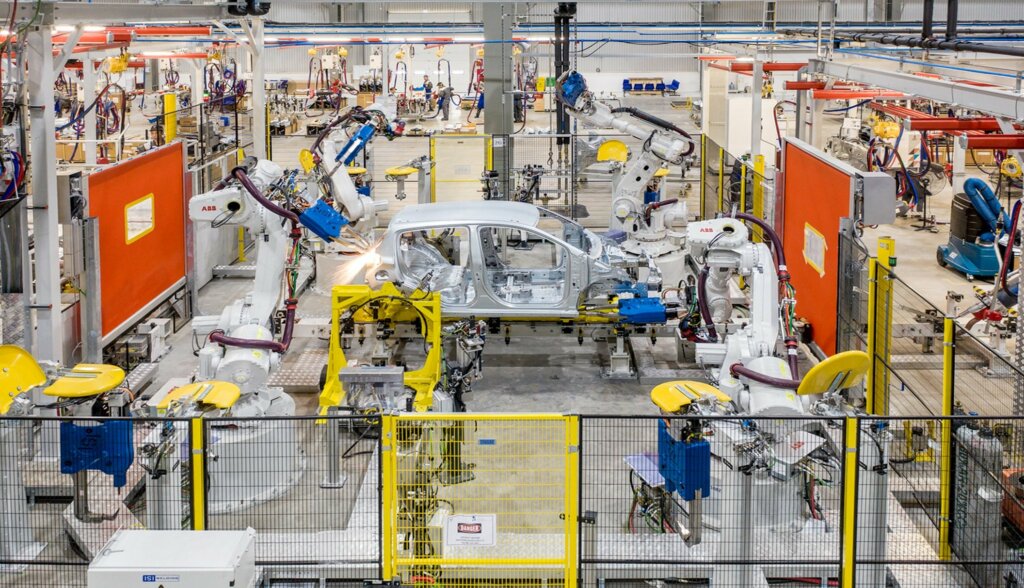
VinFast will invest up to US$2 billion for EV in India. (Image by VinFast).
VinFast invests in India
Following its global success, Vietnamese EV manufacturer VinFast has announced a partnership with the Tamil Nadu State Government in India to charge the development of green transportation in the country. VinFast and the state government will work towards a total investment of up to US$2 billion, with an initial commitment of US$500 million in the first phase of the project.
The investment includes the establishment of VinFast’s integrated electric vehicle facility in Tamil Nadu. It is anticipated to generate approximately 3,000 – 3,500 employment opportunities locally. Situated in Thoothukudi, the VinFast Tamil Nadu project aims to evolve into a first-class electric vehicle production hub in the region, with an annual capacity of up to 150,000 units. Construction of the plant is anticipated to begin in 2024.
Besides the economic benefits, the project will also pave the way for green transportation development, targeting 30% of newly registered private cars to be electric. This aligns with the state government’s initiatives to minimize carbon emissions in the transportation sector.
“The MoU demonstrates VinFast’s strong commitment to the sustainable development and vision of a zero-emission transportation future. We believe that investing in Tamil Nadu will not only bring considerable economic benefits to both parties but will also help accelerate the green energy transition in India and the region,” commented Tran Mai Hoa, deputy CEO of sales and marketing at VinFast Global.
Dr. TRB Rajaa, Minister of Industries of the Government of Tamil Nadu, stated, “EV manufacturing companies are not only important economic drivers but also powerful accelerators to the State’s green vision. We are delighted that VinFast has chosen to invest in Tamil Nadu to establish its integrated EV facility. Possessing robust capabilities and unwavering commitment to a sustainable future, I believe that VinFast will emerge as a reliable economic partner and substantial contributor to Tamil Nadu’s long-term development.”
The green mobility project by VinFast is its biggest investment. The project will create many positive impacts on the economy and society. Both sides will also work together and explore options for setting up charging stations to promote a sustainable transportation future.
READ MORE
- 3 Steps to Successfully Automate Copilot for Microsoft 365 Implementation
- Trustworthy AI – the Promise of Enterprise-Friendly Generative Machine Learning with Dell and NVIDIA
- Strategies for Democratizing GenAI
- The criticality of endpoint management in cybersecurity and operations
- Ethical AI: The renewed importance of safeguarding data and customer privacy in Generative AI applications

